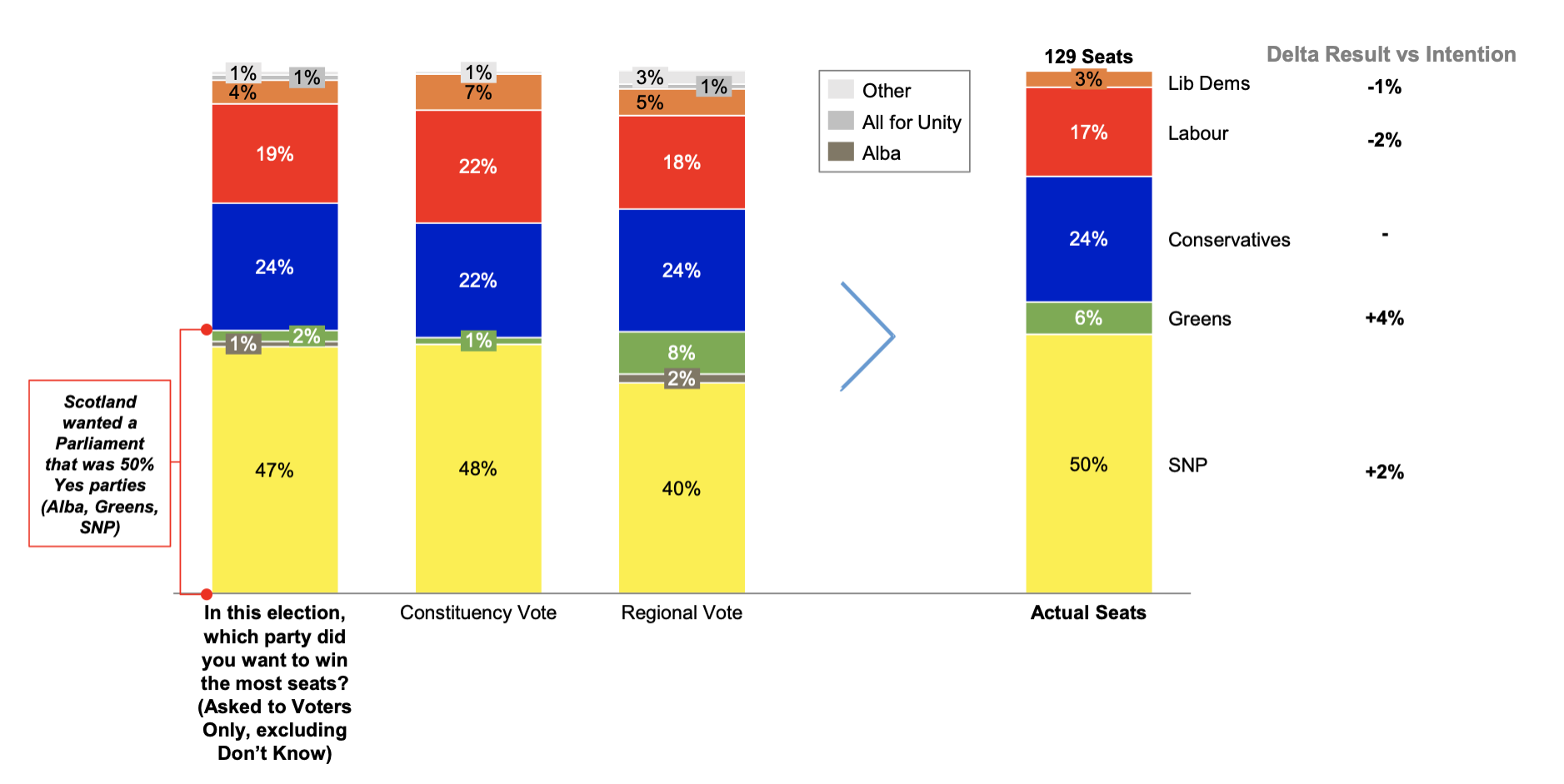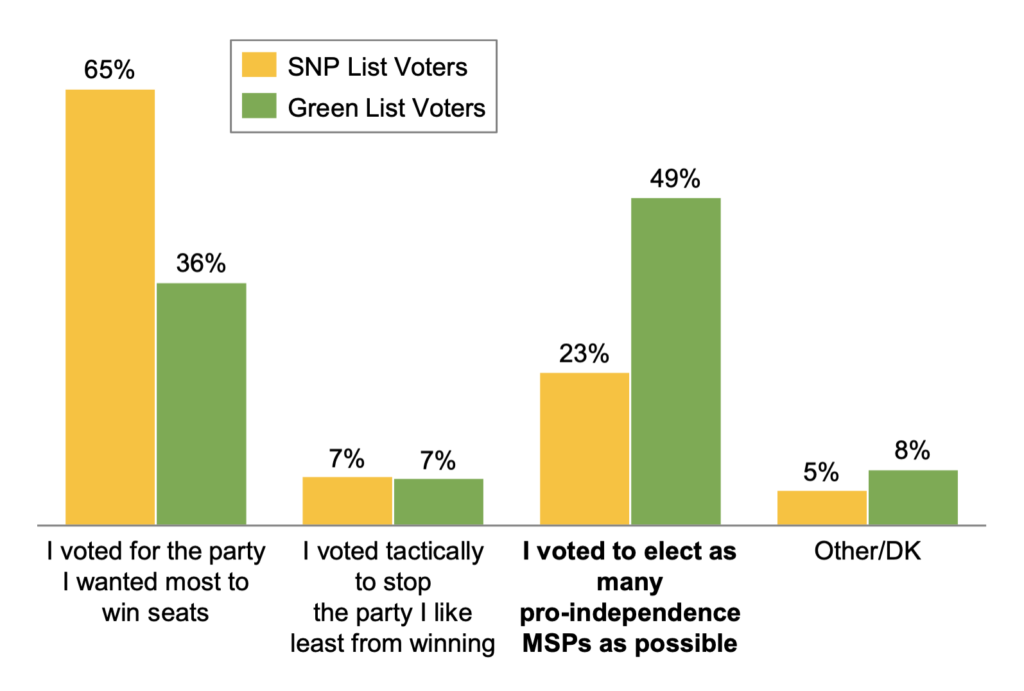In the words of the Scottish academic Colin Kidd, academics and thinkers have tended to view the case for the union of the United Kingdom as an ‘intellectual dead-end’. Either the arguments in favour of the UK have been taken as so self-evident that nobody has felt it necessary to set them out – what Kidd has termed “banal Unionism”. Or it has fallen back on hackneyed cliches around empires built and battles won. With the SNP having forced Scottish nationalism into the political mainstream over the last few years, so the lack of a modern intellectual scaffolding on which to build a firm pro-Union argument has been exposed.
Is this now changing? One of the more surprising and interesting developments since May’s Holyrood election is the extent to which most of the thinking and questioning about the future of Scotland and the UK is coming largely from the pro-Union side. This brief period of relative calm in Scotland’s relentless electoral calendar is being used to challenge assumptions and scrutinise principles; to kick the pro-UK tyres.
Take some of the evidence being given to committees in the Houses of Parliament in recent weeks by some prominent former civil servants and ministers in the UK administration who have had deep and first hand experience of the last twenty years of devolution. It’s a pity that the Scottish Parliament has so far found itself unable to hold such conversations because the insights that have been offered to the House of Commons and House of Lords in recent weeks have given a more mature assessment of the UK’s constitutional position than anything that has emerged from Holyrood in the last few years. Their evidence has focussed on the general question of how the UK Government faces the Union question and how it manages the newly devolved nation state. There is too much to distil down into one short article, but some key issues are worth flagging up.
What do we actually mean by the union?
The House of Lords constitution committee is currently looking at the future governance of the UK. Last week it took evidence from two senior figures with immense governing experience, Philip Rycroft, the ex-Permanent Secretary at the Department for Exiting the European Union (and a current director of this think tank), and Ciaran Martin, a former chief executive of the National Cyber Security Service (both were also recently interviewed by Reform Scotland).
Martin raised what is a first principles issue.
“There is an important question for British politicians in power and seeking power at a UK-wide level to think about what sort of union they are trying to preserve? There are two models – a multinational, diverse, multigovermental UK. Or a more assertively singular British states model of unionism.”
The latter, he noted, was a form of “Anglocentric British nationalism”. Both visions of the Union were valid, Martin noted, but in practice they are mutually incompatible. The problem is that, having created the former Union by introducing devolution, the British State largely carried on as if it hadn’t happened. Martin recalled the mood in the civil service in the late 90s after devolution was introduced. The country had just come out of recession, had tamed inflation and had got the public finances back under control. The view from Whitehall about devolution, Martin recalled, was “Whose crazy idea was this and how can we limit the damage?”
“If you contrast the pageantry of the official opening of the Scottish Parliament in 1999 with Her Majesty the Queen and Donald Dewar and all of that, with the obsession—and I would call it that—with just making sure that these new bodies were under control, the failure to engage with that debate about the emotional re-engineering of the union will not be looked favourably on, I think.”
Together with that institutional resistance, there developed a culture of what has become known as “devolve and forget”. Government departments weren’t incentivised to think creatively about the Union or to consider how sharing power or working with the devolved administrations might work.
Rycroft noted:
“The result of all of that was that devolution tended to be pushed to the periphery of departmental understanding, departmental management and departmental attention; that was both political and official. We made some progress over those seven years but, frankly, with the demands of Brexit and then of Covid, of course this has had to take bit of a back seat.”
Of course Brexit changed the entire dynamic and brought to the surface the conflict between the two definitions of the Union – with the more traditional version winning hands down. It has now left a question hanging in the air, as Rycroft put it.
“Do you seek to go down a road of collaboration and co-operation (with the devolved nations and regions) or do the UK Government seek to impose their view, whatever the thoughts of the devolved Governments?”
It is both easier for Whitehall and more politically palatable for the current UK Government to do the latter. Efforts to reform the Union are undermined, concluded Rycroft, by “the weakness of understanding in depth in Whitehall but I would say also in Westminster about devolution and the politics of the devolved parts of the UK, compounded in recent years by an unwillingness, a political failure, to accept the legitimacy of the voices of the other parts of the UK and to give them due accord in the important debates on the issues of the day.”
Martin quoted Robert Saunders of Queen Mary University.
“(He) said that the problem at the moment is that there is a risk that the Government’s approach to the union, their love for the union, if you like, is like the love for a possession, something one owns, rather than the love for a partner.”
Love for a partner, he added, requires you to “choose to act differently for the sake of the partnership”.
What's needed is statecraft, not just structures
These parliamentary sessions come as Whitehall prepares to unveil a new agreement on intergovernmental relations with the devolved administrations. A 15-page draft has already been drawn up, codifying how the UK Government and the devolved administrations will relate to one another. The hope is that it will be signed off in the next few weeks. Everyone agrees this is clearly necessary and welcome but to assume that a guidebook on setting out the rules of engagement will provide the underpinning for the Union is a superficial reading of events. It is not just the lack of a document, but the lack of imagination that has led to the current impasse.
Rycroft told the Lords:
“When the history of this period, and I am talking about the last quarter of a century, is written and all of us around at the time have some responsibility for this, I think the sheer technocracy with which we responded to devolution will be seen as a weakness, a failure to grasp the extent of the cultural, emotional and national identity changes, particularly in Scotland.”
Martin concurred:
“Something we might come on to—and I share responsibility for this—is the UK state’s approach to devolution since its inception a quarter of a century ago, which has been excessively technocratic and not thinking about the vision of the sort of United Kingdom we want to have.”
Questioning the pair, Lord Hennessy set out the matter too.
“I have always felt that funding formally, devo maxing, refreshing of structures and so on are absolutely critical too, but above all it is what General de Gaulle was alluding to in the first line of his memoirs when he wrote, “I always had a certain idea of France” and unless you have a certain idea of the union, really it is all lost.”
What has been missing, said Martin, is a “thoughtfulness on the Union”. Contrast the UK Government’s approach to the Union to the way, for example, the peace process was agreed in Northern Ireland by Conservative and Labour administrations in the mid-90s.
Martin noted:
“If you compare, for example, the statecraft that went into many, many years in extraordinarily difficult circumstances—over both Conservative and Labour Administrations—that led to the settlement in Northern Ireland in 1998, and you look at many of the papers that have been declassified, and you look at the profound thinking given to things like the statements in the Downing Street Declaration and the initial statement authorised by Mrs Thatcher about no selfish or strategic interests in Northern Ireland, that cut-through, that strategic emotionally sharp political statement followed through into action in terms of the agreement with the Irish Government in December 1993, it is hard to see that sort of strategic thinking incentivised in the Whitehall that I left.”
It is the lack of statecraft that “is most deficient” within government when it comes to the Union, he concluded.
It was a theme that was taken up in an earlier meeting of the House of Commons Public Administration and Constitutional Affairs Committee by Andrew Dunlop, the Conservative peer who was the key advisor to David Cameron during the Independence Referendum. More recently, Dunlop has published a Review of Intergovernmental relations examining the relationship between the centre and the devolved nations. His main purpose, as he told the Committee, was to bring about the same culture change at the centre of power.
“My main approach to intergovernmental relations is to change them from a very defensive activity where everybody puts on their hard hat, grins and bears it and tries to get through, minimising the chance of fallout. I want the whole atmosphere around intergovernmental relations to change, to make a much more proactive agenda that looks at where there are issues of common interest—and there are many—where the powers of the UK Government and the devolved Governments intersect, and it makes sense to work together, whether it comes to the productivity challenge, how to address climate change or tackling drug abuse. Those are all areas that would benefit from a common approach and working together.
“We can talk about structures, but my whole approach is that at the heart of this is how you change culture. There is no magic silver bullet for changing the culture in an organisation; it requires a whole series of things. My report was a series of interlocking measures to create the right package of incentives to change that culture. If you are to achieve that culture change, you need to look at it and take it forward as a package.”
So, what should be done?
There may be no magic bullets, but what are the ways to bring about this culture change?
Dunlop’s Review set out a series of recommendations – a new UK Intergovernmental Council to improve relations between the various UK Governments; a joint fund to promote UK wide projects and collaborative working; a new great office of state, a First Secretary of State for Intergovernmental affairs; and reform of the civil service so promotion is dependent on knowledge of devolution. Some are being adopted by the UK Government, others – such as a new Cabinet Minister – are not.
In their evidence, Rycroft and Martin threw up some more reforms. The new package of measures on intergovernmental relations introduced by the UK Government might be put on a statutory footing, argued Rycroft. And there is the wider question of whether “muddling through” has run its course and the UK finally needs to write down its constitutional foundations.
Rycroft noted:
“There is a question as to whether the UK would ever be prepared to move into the space of a formal written constitution in the way that pretty much every other democracy in the world, as we know—bar New Zealand and Israel, to memory—has. We have never had that sort of foundational moment where that has been required. You could argue that muddling through—going back to the 1832 Reform Act and all major subsequent reforms since then—has sort of worked for the UK. I do wonder, however, whether we have reached the moment—with all the things we have been discussing today and also with the way in which the conventions that have hitherto propped up our constitutional arrangements have frayed or been seen to fray—to step back and to say, if not a full-blown written constitution, “There is more of this stuff that needs to be written down”.
He also raised the consent – what should happen when, in a devolved or an area of shared responsibility, a devolved government refuses to back a proposed reform (the obvious example being the implementation of Brexit)? Rycroft asked:
“Should there be a requirement, for example, if the UK Government wish to act in the teeth of opposition from the devolved Governments, for a second look, for a delay?
“Short of an absolute veto on the part of any one Government, as in the Carwyn Jones proposal from the Welsh Government, should the UK Government need at least one other devolved Government on side to take a proposal through?
And, then, there is the question of England. Rycroft floated the idea of a Minister for England.
“I think there is an argument to say about departments where self-evidently 99% of their business is English business, why not make those explicitly English departments? People may say, “Won’t that detract from the union as a whole?” I think clarifying where power lies and where responsibility lies will help people to understand the nature of the union as we have it now, post devolution. Whether there is a place for England in the structures of intergovernmental relations has been mentioned already. At the moment the UK Government wear both the UK hat and the English hat. That militates against coming to conclusions in that context where the UK Government can be seen to be operating for the whole of the UK.”
The value of deeper thinking
These are – as already discussed – largely technocratic answers to the debate around the future of the United Kingdom. But they are far from irrelevant. These dry debates about the nature of intergovernmental relations, joint ministerial committees, and dispute resolution mechanisms are better seen as the bureaucratic tip of the deep social and cultural questions that face this complex messy nation, and our own interest in its continued good health. Questions like – is this a nation which is prepared to expend energy, time and thinking power on the question of its continued existence? Or questions like – faced with the possibility of divorce, is this a country that wants to work at keeping together? For many the best answer – as with the West Lothian question – is not to ask such questions: after all, the Union works just about; don’t make the perfect the enemy of the good; be careful about opening a pandora’s box. But – post devolution, Brexit and Covid – this model of muddling-through-Unionism is being stretched to breaking point. And here is the rub. The case for Scottish independence isn’t rooted in the supposed practical benefits of secession – after more than a decade in office, neither Alex Salmond nor Nicola Sturgeon has found a convincing sales pitch which convinces a majority of Scots. Rather the case for independence is growing from a sense, repeated incessantly by the Nationalists, that the country is inevitably drifting apart and that there’s nobody, least of all Whitehall and Westminster, who is really given much thought to stopping it. It’s a model which sees independence happening by way of indifference.
This is why the thinking on the Union emerging just now is so welcome and necessary. It is having an impact in the corridors of power. It also shows that, far from being an intellectual dead-ed, there are people across the UK engaged and focussed on the fundamental questions: why bother with a Union? What is it for? How can we make it better? Most of the intellectual heavy-lifting in the debate around the future of the UK is currently coming from those who would like it to have one. This is a cause for optimism.













